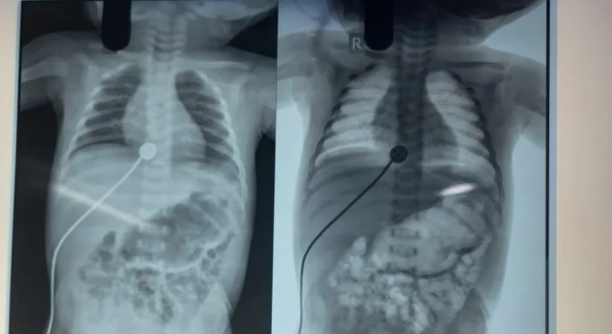Abdominal X-rays (showing dilated bowel loops)
Contrast Enema (helps identify the blockage)
Genetic testing if cystic fibrosis is suspected
Ultrasound for prenatal diagnosis in some cases
Meconium Ileus
Home »Meconium Ileus
What is Meconium Ileus?
Meconium Ileus is a bowel obstruction in newborns caused by thick, sticky meconium (the baby’s first stool) blocking the small intestine, typically the ileum. It is often the first sign of cystic fibrosis (CF) and requires prompt treatment to avoid complications like bowel perforation or infection.

Causes and Risk Factors
Cystic Fibrosis (present in up to 90% of cases)
Abnormal meconium composition (very thick and dehydrated)
Underdeveloped intestinal motility
Family history of genetic disorders
Symptoms of Meconium Ileus
No passage of meconium within the first 24–48 hours after birth
Abdominal distension (swollen belly)
Vomiting, often greenish (bilious)
Poor feeding
Dehydration and lethargy
Diagnosis at Little Light Clinic
Treatment Options
Non-Surgical (Medical) Management:
In uncomplicated cases, a contrast enema may help flush the meconium and relieve the obstruction.
Surgical Intervention:
If non-surgical treatment fails or there are complications (e.g., perforation, volvulus), surgery is necessary.
The blocked segment is removed, and a temporary stoma may be created, followed by a second-stage surgery for bowel reconnection.
- Malrotation
- Pyloric Stenosis
- Intestinal Atresia
- Meckel's Diverticulum
- Gastroschisis
- Meconium Ileus
- Crohn's Disease
- Meconium Plug
- Necrotizing Enterocolitis (NEC)
- Perianal & Perirectal Abscess
- Omphalocele
- Short-Bowel Syndrome
- Ulcerative Colitis
- Umbilical Infection (Omphalitis)
- Anorectal Malformations
- Intussusception
- Hirschsprung's Disease
- Appendicitis
- Spleen Problems
- Umbilical Hernia

